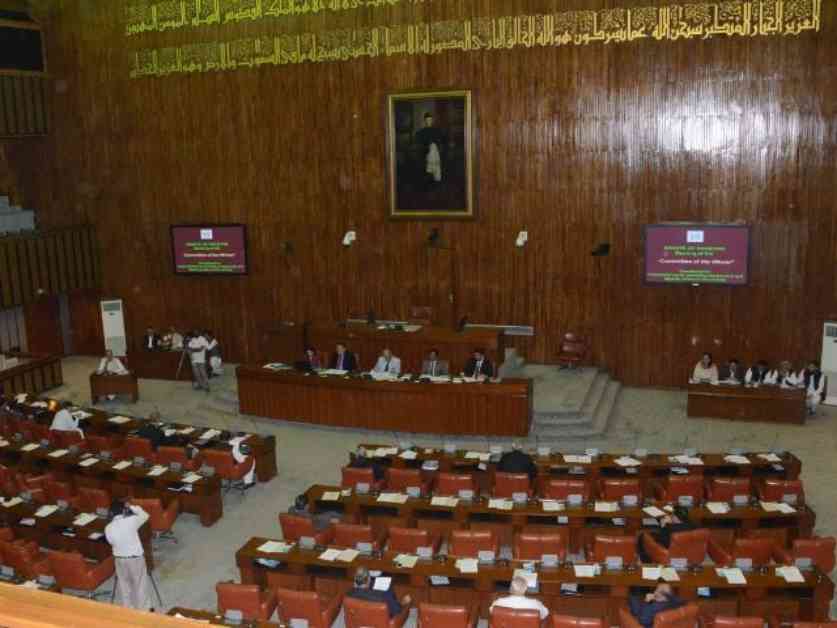Senate Approves PECA Amendment Bill Amid Journalists’ Outcry
In a whirlwind of legislative activity, the Senate of Pakistan made headlines on Tuesday by approving the Prevention of Electronic Crimes (PECA) (Amendment) Bill 2025 and the Digital Nation Pakistan Bill 2024. However, this milestone was not without its fair share of drama, as journalists staged a walkout in protest, and opposition members voiced their dissent.
The PECA Amendment Bill, championed by Minister for Industries and Production, Rana Tanveer Hussain, on behalf of Interior Minister Mohsin Naqvi, had already cleared the hurdles of the National Assembly and the Senate’s Interior Committee. Despite this, the bill faced staunch resistance from the media fraternity, who deemed it a threat to press freedom.
As the session unfolded, Defence and Aviation Minister Khawaja Asif took the floor to discuss the government’s efforts to revitalize smaller airports across the country. Notably, Chitral’s airport was highlighted as a success story, now fully operational. Moreover, Pakistan International Airlines (PIA) was lauded for its resurgence, with flights to smaller airports resuming and plans for acquiring new aircraft in the works.
However, these positive developments were overshadowed by concerns raised by Senator Saifullah Abro regarding PIA’s limited fleet and operational challenges. Senator Abro emphasized the urgent need for more aircraft and improved flight schedules. In response, Minister Asif reassured the Senate of ongoing efforts to strengthen PIA’s operations and expand its reach to underserved regions.
The session took an intense turn when Senator Azam Nazir Tarar introduced the Migration Smuggling Amendment Bill 2025 and the Immigration Ordinance Amendment Bill 2025. These bills were swiftly referred to the relevant standing committees for further scrutiny, underscoring the Senate’s commitment to due diligence.
Minister for Law Azam Nazir Tarar then brought forth the Digital Nation Pakistan Bill 2025, sparking heated debates and opposition protests. Despite objections from some members, the bill secured a majority vote, signaling the government’s determination to push forward with its digital agenda.
However, the most poignant moment of the session came when parliamentary journalists staged a walkout in protest against the PECA Amendment Bill. The Pakistan Radio Association (PRA) led the charge, denouncing the bill as a “black law” that threatened press freedom. In a show of solidarity, PPP Senator Sherry Rehman stood with the journalists, echoing their concerns and vowing to address their grievances.
Senator Rehman’s impassioned plea resonated with many as she highlighted the lack of consultation and transparency surrounding the PECA Act. The journalists’ outcry served as a stark reminder of the delicate balance between security and civil liberties in the digital age.
As the Senate delved into the nitty-gritty of the PECA Act Amendment Bill 2025, Senator Kamran Murtaza’s proposed amendments were met with resistance, ultimately leading to the bill’s passage with a majority vote. The contentious nature of the bill underscored the complex challenges of regulating digital spaces in a rapidly evolving landscape.
At the heart of the PECA Amendment Bill lies the government’s commitment to combating fake news and online misinformation. The proposed amendments, including stringent penalties for spreading disinformation and the establishment of a Digital Rights Protection Authority (DRPA), aim to safeguard digital integrity while upholding freedom of expression.
While proponents argue that these measures are necessary to curb online abuse, critics warn of potential censorship and infringement on individual rights. The debate surrounding the PECA Act serves as a microcosm of the broader conversation on how societies navigate the digital realm in an era of heightened connectivity and information overload.
In conclusion, the Senate’s approval of the PECA Amendment Bill and the Digital Nation Pakistan Bill marks a pivotal moment in Pakistan’s digital transformation journey. As the country grapples with the complexities of the digital age, striking a delicate balance between security and freedom remains a formidable challenge that requires thoughtful deliberation and robust engagement from all stakeholders.









